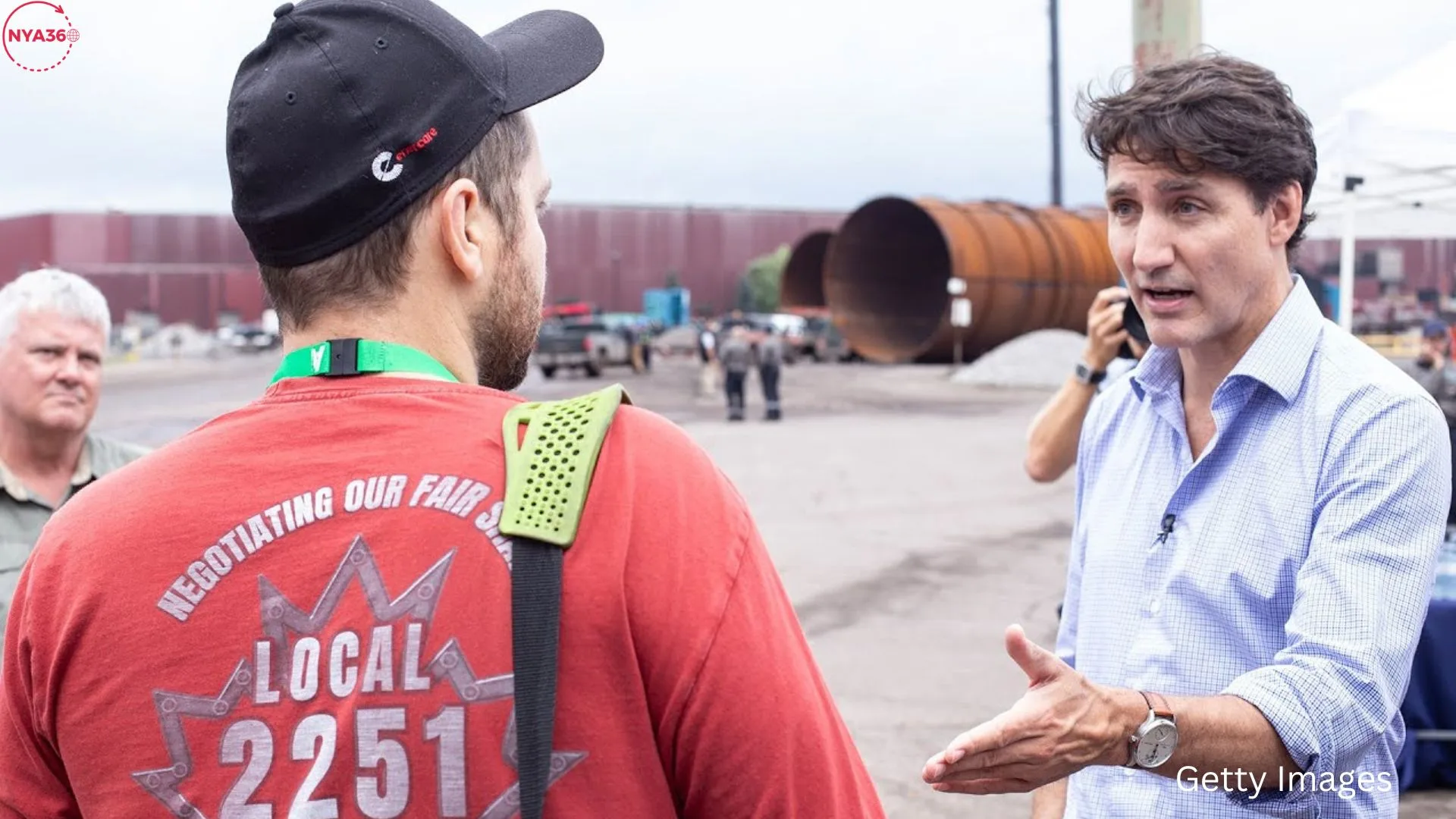During a dramatic incident at the Algoma Steel facility in Ontario, Canada, Prime Minister Justin Trudeau was confronted by a fervent steelworker expressing concerns about job stability and the condition of the Canadian healthcare system. The intense confrontation, which has subsequently attracted considerable online attention, underscored the increasing dissatisfaction among Canadian workers who perceive themselves as being neglected by the government’s policies. This instance highlights the wider difficulties that Trudeau’s administration is dealing with, including economic pressures and a healthcare system that is suffering.
Trudeau encountered a variety of inquiries from workers during his visit to the Algoma Steel mill. Many of these individuals voiced dissatisfaction regarding the prospects of their employment and the accessibility of high-quality healthcare. A certain worker openly challenged the Prime Minister, expressing his doubts without hesitation. The worker allegedly expressed skepticism, stating a perspective that seems to strike a chord with a significant portion of Canada’s working class.
The discussion encompassed not only employment opportunities but also the wider economic strategies implemented by Trudeau’s administration and how they were seen to be affecting the average citizens of Canada. The worker’s confrontation with Trudeau underscores a disparity between the government’s promises of economic stability and the actual hardships faced by individuals who encounter job instability and declining public services.
Algoma Steel, situated in Sault Ste. Marie, Ontario, is among the major steel manufacturers in Canada and has played a vital role in the local economy for many years. Nevertheless, the steel industry in Canada has encountered substantial obstacles in recent years, such as heightened competition from international markets, volatile demand, and the repercussions of tariffs. Employees at Algoma, like workers in numerous other industries, are apprehensive about the stability of their jobs as the corporation grapples with these economic challenges.

The dispute at Algoma Steel exemplifies wider apprehensions regarding the trajectory of Canada’s economy under Trudeau’s stewardship. A significant number of employees express concerns about the vulnerability of their positions as a result of worldwide competition, automation, and what they regard as insufficient assistance from the federal government. These fears are intensified by the economic uncertainties created by the COVID-19 pandemic, which has further heightened the anxiety among many Canadians regarding their financial prospects.
Aside from economic considerations, the steelworker also brought up the matter of healthcare, which has become progressively more controversial in Canada. The nation’s healthcare system, which has historically been a source of great national pride, has experienced considerable pressure in recent years. The COVID-19 pandemic revealed and worsened preexisting vulnerabilities, including extended waiting periods, insufficient staffing, and inadequate funding.
The worker’s cynicism towards Trudeau’s pledges about healthcare exemplifies a more widespread discontent among Canadians with the present condition of the healthcare system. Although Trudeau’s administration has made commitments to tackle these concerns, there is a widespread perception that the pace of development has been sluggish and that the standard of service has deteriorated. As a result, voters are increasingly frustrated with the government’s perceived lack of effort in safeguarding and enhancing public services.
Prime Minister Trudeau, renowned for his refined political demeanor, endeavored to address the concerns of the workers throughout the interaction. The leader restated his government’s dedication to generating employment opportunities and ensuring economic steadiness, emphasizing investments in infrastructure and environmentally friendly technology as means to achieve future success. Trudeau further justified his government’s performance in the healthcare sector, highlighting recent financial boosts and initiatives to attract additional healthcare practitioners.
Nevertheless, the steelworker’s unequivocal rejection of Trudeau’s reassurances indicates that these pledges are not finding resonance among all Canadians. The occurrence at Algoma Steel perhaps indicates a widening gap between Trudeau’s administration and the working-class electorate, who are experiencing a rising sense of disappointment with the political elite.

The altercation occurring at Algoma Steel extends beyond a brief interaction; it has the potential to hold substantial political consequences for Trudeau and his Liberal Party. With the next federal election in Canada, there is a growing concern among voters regarding the government’s management of economic and healthcare matters, which could have significant negative consequences. Trudeau, who has portrayed himself as a defender of the middle class, may face growing challenges in upholding this perception if more workers, such as those at Algoma Steel, express their dissatisfaction.
In addition, the conversation has already begun to spread extensively on social media, where it is being utilized by Trudeau’s detractors to emphasize what they perceive as the Prime Minister’s inability to establish a rapport with regular Canadians. The contagious character of the confrontation might magnify its influence, especially if it is embraced by opposition parties as a representation of Trudeau’s detachment from the working class.
The intense confrontation between Prime Minister Justin Trudeau and a steelworker at the Algoma Steel mill in Ontario serves as a clear indication of the difficulties that the Canadian government is now grappling with Trudeau’s political survival will depend heavily on his capacity to successfully tackle the pressing concerns around job security and healthcare. The incident at Algoma Steel may serve as a significant episode within a broader context of worker discontent and government disillusionment. This event has the potential to strongly influence the upcoming Canadian election.
Follow us on social media: Instagram, Threads & Twitter X @nya360_ YouTube & Facebook @nya360.





